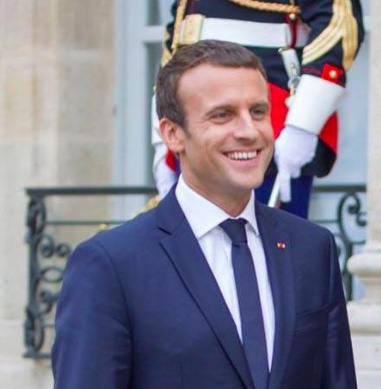
It’s hard to guess from French media coverage a year and a bit into Emmanuel Macron’s presidency, that despite the chaos of mass demonstration, paralysing train strikes and a string of unpopular reforms, he’s considerably more popular at this stage in the game than were his three predecessors. With an approval rating of 44%* (Jacques Chirac was down to 37% after a year in office, Nicolas Sarkozy down to 36% and Francois Hollande to 25%) Macron has retained the support of almost 95% of those who voted for his En Marche movement and has won the approval 1 out of 2 republican (LR) voters and 1 out of 3 socialist (PS) voters.
Why then is the national mood being relayed on French news that of profound discontent? In its coverage of the recent anti-Macron demonstration, la Fête à Macron, organised by former rival in the presidential race, Jean-Luc Melanchon and his movement, La France Insoumise (Unbowed France), Le Monde ran the headline, “In Paris tens of thousands of demonstrators unite to ‘throw Macron a party’” – faire ta fete having come to mean ‘beat you up’. According to both the Police and an independent collective of journalists, about 40,00 people attended the march, which, as one Le Monde reader put it, “makes it neither a success nor a failure, but just the normal low-water mark of a popular demonstration on a sunny Saturday afternoon.
The gap between the French media’s portrayal of the presidency and the lukewarm popular judgment reflected in the polls was most apparent in the lengthy televised interview that marked Macron’s first year in office. Investigative journalist Edwy Plenel and political talk-show host, Jean-Jacques Bourdin began by positing Macron’s presidency as divisive and unpopular: “Many French people doubt you and your choices,” Bourdin opened. “And they’re losing their patience. Are you not simply an illusionist risen from the heart of history?”
“You made a mistake [in choosing] the name of your movement,” Edwy Plenel later suggested. “You should have called it, En Force.” i.e By Force instead of En Marche, or forwards). “You’ve divided the country instead of unifying it.”
“Is that a question or an argument?” Macron replied. “It sounds like an argument.”
There’s no doubt that discontent is likely to attract more clicks than contentment, but this is not enough to explain the gap in perception. My own family is divided on the subject of Macron himself – my daughter supports him and my son doesn’t – but they both agreed on the ‘mauvaise foi’ (intellectual dishonesty) of Plenel and Bourdin’s line of questioning: “You’d think the country was in flames” (à feu et à sang), my daughter said after Plenel’s question on the strikes. Even the iconoclastic Charlie Hebdo – which in the aftermath of the often disconcertingly aggressive two and a half hour interview – considered Macron to have come out on top. Its cover portrayed Plenel and Bourdin’s caricatures covered in bruises and plasters with the caption, “Two journalists beaten up by a head of state right in the middle of Paris.
The generation gap may offer a clue to Plenel and Bourdin’s open hostility to the young upstart Macron to whom they pointedly referred throughout as Emmanuel Macron as opposed to the traditional ‘Monsieur le President.’ But I think the key to their antagonism lay in Macron’s final answer to Plenel’s question about how to solve gender inequality in France
Once Macron had pointed out that his movement En Marche was the first party in French history to send an equal number of male and female MPs to parliament, he went on to denounce what he perceives as a lasting hypocrisy in French political life, that when it comes to inequality, politicians on both left and right make do with words rather than actions. (The constitutional refusal to countenance positive discrimination or gather statistics on ethnic minorities doesn’t help with this inaction.) The righteous indignation being expressed by Plenel and Bourdin is, Macron suggested, no longer enough. It’s time to dismantle the carefully constructed privilege and hierarchy, that culture of “insiders” and “outsiders” inherited from pre-revolutionary France and which allows for the fact that until now certain civil servants were guaranteed a job for life while a young developer in charge of a company’s cyber-security would be guaranteed nothing, or else that a French-born Muslim male, because of his surname, will be four times less likely to get a job here than someone with a French (Catholic) sounding surname.
This embracing of action over discourse and reality over idea is where Macron stands out, not only from his three presidential predecessors but from Bourdin and Plenel themselves. By actually naming the causes of inequality Macron bursts the bubble of the French equality myth, which has so long survived on storytelling alone. The hostile response is because he’s trying to force them to leave the pleasure principle and its alluring fantasies and embrace the reality principle, wake them up to the fact that France is not an island of enlightenment floating in an ugly sea of commerce but a nation subject to the tides of global capital, to a plethora of special interests – be they corporations, banks, oligopolies or trade unions. Interests that have to be tamed, managed and/or reconciled with the desires of the population.
A version of this post appeared as a column in the May 2018 edition of Prospect Magazine
